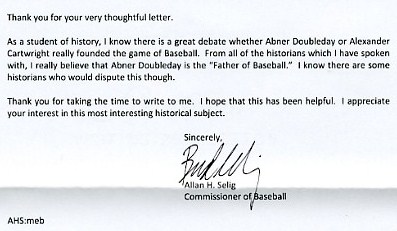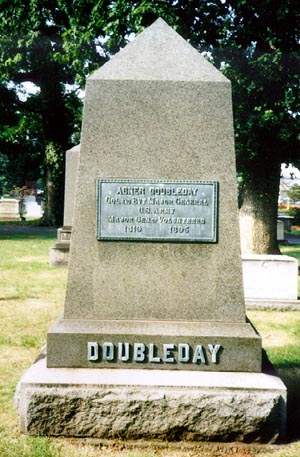(Note: This column was originally slated to run on ESPN's SweetSpot blog, but was one of two stories by The Common Man that was "spiked" for being "totally inappropriate." The other column is here.)
I don’t like Bud Selig. You don’t like Bud Selig. None of us really likes Bud Selig. And yet, despite several PR nightmares, such as the strike in 1994, the All Star Game tie in 2002, and the steroid scandal in the late 1990s and early 2000s, as his epoch as the Commissioner of Baseball winders down, baseball seems to be in a relatively good place. Revenues are up. Attendance is relatively strong. There is labor peace. Baseball has its own TV network. The owners are pretty organized. But the public perception of Bud Selig has continued to lag. The reasons for this are easy to see. He’s still acts like a bit of a boob. He’s still seen as a little clueless. He follows the tradition of creatively named commissioners (Happy, Bowie, Ford, Kenesaw, Fay). Indeed, he’s still not terribly popular outside of Milwaukee, where he will always pretty much be a patron saint.
And rightfully so. When baseball has struggled, so has the commissioner. He’s been a reflection of baseball’s failings and strengths over the last 20 years. He’s struggled to explain why baseball didn’t respond sooner to steroids. He’s looked clueless as the spectacle of the All Star game turned into a debacle. When baseball’s excesses have taken the stage, Bud’s proven ill-equipped to put out public firestorms, and often exacerbated the problem by undermining the game itself (such as by saying that “small market” teams couldn’t compete). Someone with more P.R. sense might have managed to make lemonade out of baseball’s lemons (or at least a decent G&T), but Bud’s only managed to pour juice into baseball’s wounds. He’s tried so hard to be the commissioner that fans need and want, but he’s ultimately the commissioner baseball deserves. One who publically seems incompetent while privately marshaling forces and keeping the ship on course (even if it isn’t always steady).
 |
| Image via Hauls of Shame |
This is, of course, ridiculous. The myth of Abner Doubleday comes via another commissioner-convened committee that was charged to explore the game’s origin. The Mills Commission of 1905 used the testimonial letter of 71-year old Abner Graves (a man who soon after sending it murdered his wife and was committed to a mental asylum) to declare that Doubleday invented the game in 1839 on the shores of Lake Otsego near Cooperstown, New York (despite the fact that Doubleday was enrolled at West Point at the time). Frankly, you probably know most of this story if you’ve ever watched Ken Burns’ documentary. You also may have read similar versions of the story in John Thorn’s Baseball In the Garden of Eden or Harold Seymore and Dorothy Jane Mills’ Baseball: The Early Years. Or seen MLB.com’s documentary on it (h/t to Craig Calcaterra).
So what gives? Why in the world would we need a committee to investigate what everyone already knows? Forming committees gives the impression of action. Bud Selig isn’t actually going to do anything. But in putting the committee together, it looks like he is. And when the group comes back with its findings,* Bud will get to stand up at a podium and announce the results. And he will get to look the part of the commissioner, even if he’s accomplished absolutely nothing. Commissioner Bud loves committees. After all, he’s had the committee to determine whether the Oakland A’s can move to San Jose meeting since March of 2009. He’s had a special committee for on-field matters (which has yet to recommend anything meaningful) and a blue-ribbon committee to recommend changes to the playoffs (which streamlined the playoff structure). But every time they meet, Bud Selig gets to stand in front of a podium and act like a commissioner.
*And really, the meeting should go something like “Anybody here think Abner Doubleday invented baseball? Put your hand down, Mr. Selig. No one else? OK, what’s for lunch?”
Bud’s time as a commissioner is winding down. He’s 76 years old. He’s supposedly set to retire after 2012 (though he’s had his contract unexpectedly renewed before). This is the time when the head of any organization starts to think about his legacy, and how he will be remembered. Bud’s looking for more opportunities to act like the commissioner we wish he were, rather than the one he’s been. So expect more of this. More grandstanding, more pronouncements, more committees. You’re going to see a lot more of Commissioner Bud as he puts his final stamp on the game that he has served (and which has served him) for so long. He can’t give up trying to be the commissioner that baseball needs, rather than the one it deserves.*
*I think what I’m saying is…Bud Selig is Batman.



1 comment:
Hey Bud - how about starting with not blacking out Saturday afternoon baseball so I can watch games of our favorite team with my son as he grows up? Novel idea, huh? It's disgusting that you will take $200 for a "season pass," yet black me out on Saturday afternoon of all times, with the absurd notion that I will watch Mets/Marlins because you have deemed that appropriate coverage. Actually, I'll find something else to do or another sport to follow, thank you.
Post a Comment